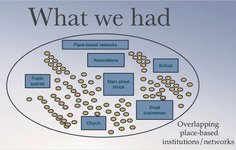Why we need to design community into neighborhoods
cnu.org
Why we need to design community into neighborhoods

Walkable neighborhoods where an intergenerational mix of community members can bump into each other while they carry out the most frequent journeys of daily life (work, school, play, food, etc.) are the best way for people to see each other.